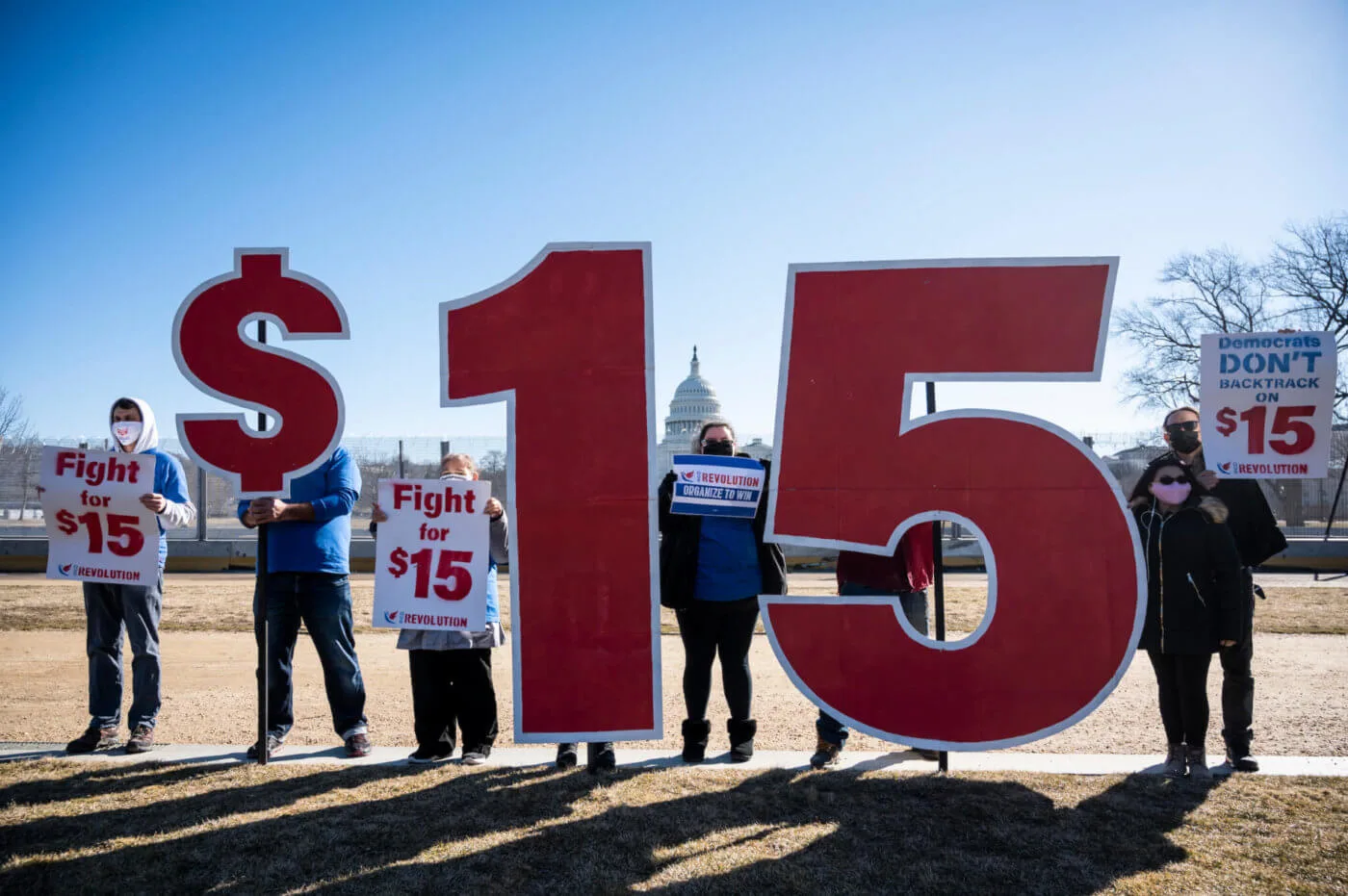
Activists with Our Revolution hold $15 minimum wage signs outside the US Capitol complex in February 2021, to call on Congress to raise the minimum wage to $15 per hour. (CQ-Roll Call via Getty Images/Bill Clark)
Pennsylvania’s economy has rebounded from the pandemic and is experiencing the lowest unemployment rates in 50 years. However, low wage workers are still making $3,500 less per year than their counterparts in states with higher minimum wages.
Advocates from the Keystone Research Center, a progressive leaning think-tank based in Pennsylvania, renewed their calls to raise the minimum wage now that the commonwealth has fully recovered from the economic issues experienced during the pandemic.
The organization released their “State of Working Pennsylvania 2024” report ahead of the Labor Day holiday, highlighting the economic progress and challenges working Pennsylvania families are facing.
“Our findings demonstrate that when governments make smart investments in workers and families, as we’ve seen in pandemic recovery efforts, it can play a vital role in lifting wages and ensuring that the rising tide of a growing economy lifts all boats,” Clair Kovach, a senior analyst at the Keystone Research Center and co-author of the report, said in a statement.
The report found that Pennsylvania’s economy is experiencing steady growth coming out of the pandemic and the commonwealth only took two years to recover instead of six years following the 2008 Great Recession.
It also found that unemployment in Pennsylvania is at a 50-year low and wage growth has outpaced inflation in all of the major demographic groups.
“While we celebrate the progress made, including the resurgence of union membership, there’s more work to be done,” Maisum Murtaza, Research Associate at KRC said in a statement. “We need to lock in shared prosperity, not revert to an economy that benefits only the very rich.”
However, even though low-wage workers have seen progress in Pennsylvania, they are still falling behind their counterparts in New York, New Jersey and Maryland, which are states that all have a $15 minimum wage.
Pennsylvanians stuck in lower paying jobs are earning $1.71 less than those in New York, New Jersey and Maryland and are missing out on more than $3,500 per year in wages when compared to workers from those neighboring states.
Democrats in the Pennsylvania House voted in June to raise the minimum wage for the first time since 2007, but that bill has remained untouched in the Republican controlled Senate.
House Bill 1500 would increase Pennsylvania’s minimum wage in three stages from $7.25 per hour to $15 per hour by Jan. 1 2026. Starting in 2027, it would then be tied to inflation and adjusted based on inflation rates.
A report earlier this year from the Keystone Research Center found that raising the minimum wage would benefit over 1.34 million Pennsylvania residents. It stated that 776,000 residents would directly benefit from an increase in the minimum wage and an additional 568,000 residents who are already earning $15 per hour would see their wages slightly increase.
“Pennsylvania workers are crossing the border to get a living-wage job; meanwhile, fewer New York workers are likely coming to Pennsylvania to take a poverty-wage job,” Steven Herzenberg, the executive director of the Keystone Research Center, said in a press release. “Pennsylvania low-wage employers, meanwhile, can’t find workers or fill vacancies because workers are crossing the border or staying home.”
Support Our Cause
Thank you for taking the time to read our work. Before you go, we hope you'll consider supporting our values-driven journalism, which has always strived to make clear what's really at stake for Pennsylvanians and our future.
Since day one, our goal here at The Keystone has always been to empower people across the commonwealth with fact-based news and information. We believe that when people are armed with knowledge about what's happening in their local, state, and federal governments—including who is working on their behalf and who is actively trying to block efforts aimed at improving the daily lives of Pennsylvania families—they will be inspired to become civically engaged.


‘Some people work their butts off and other people get rich’: Gwen Frisbie-Fulton’s view from rural America
Growing up, my dad only made two rules for me outside of my chores. The first one was that I wasn’t allowed to make soap with lye. Glycerine soap,...

Your 2025 Guide to Filing Taxes for Free in Pennsylvania
More than 2 million Pennsylvanians are eligible to file their taxes for free. Are you one of them? Tax season can be a headache, requiring you to...

Josh Shapiro hits Trump’s tariffs for “jacking up the price of goods and services”
Gov. Josh Shapiro took aim at President Donald Trump’s tariffs, which will cost Pennsylvania businesses up to $5.3 billion. Shapiro warns that dairy...

Pennsylvania governor rolls out plan to fast-track and subsidize power plants, hydrogen projects
HARRISBURG, Pa. (AP) — Gov. Josh Shapiro said Thursday that he wants to fast-track big energy projects in Pennsylvania and offer hundreds of...

Workers at a Whole Foods Market in Philadelphia become the 1st to unionize
Workers at a Whole Foods Market in Philadelphia voted to unionize on Monday, becoming the first group of employees to pull off a labor win at the...





